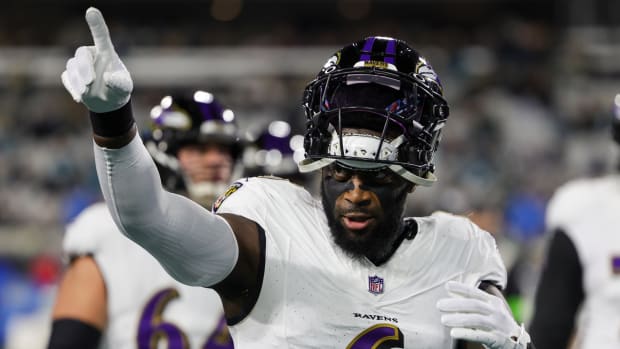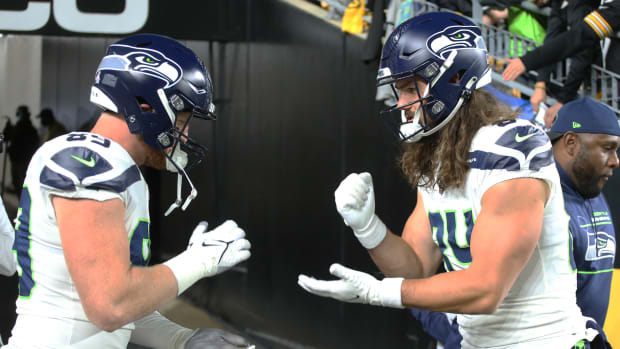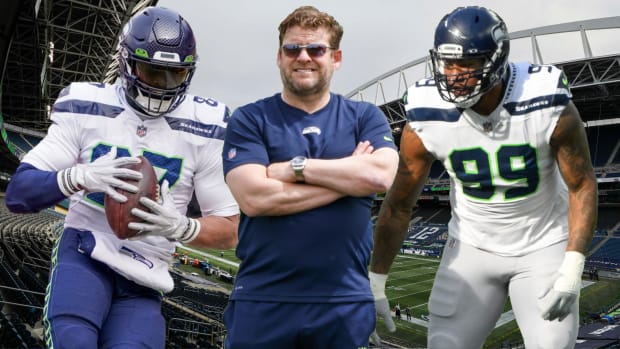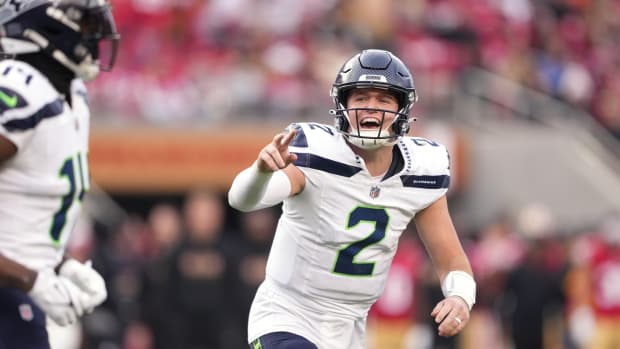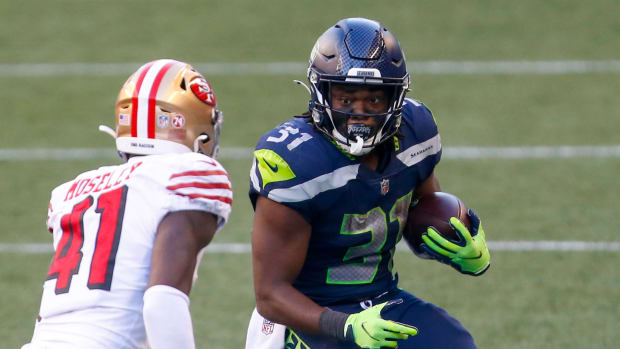Analysis: Ranking Seahawks Rumored Offensive Coordinator Candidates
Now in the midst of the second week of their search for a new offensive coordinator, the Seahawks have been linked to numerous candidates as potential replacements for Brian Schottenheimer, who parted ways with the organization on January 12.
A few of those rumored candidates - former Eagles head coach Doug Pederson and Chiefs quarterback coach Mike Kafka - appear to be off the table. Pederson reportedly is leaning towards sitting out a year to recharge, while Kafka won't entertain other opportunities and may be an offensive coordinator in waiting behind Eric Bieniemy, who remains a top candidate for the Texans head coaching vacancy.
As the Seahawks look for Schottenheimer's successor, seven other names have cropped up as potential options, including two former NFL head coaches in Adam Gase and Anthony Lynn. Taking a close look at each prospective candidate, which one would be the best fit to team up with Russell Wilson in 2021?
7. Adam Gase
Previous Position: Head coach for New York Jets (9-21 record in two seasons)
Pros: Before failing miserably as a head coach, Gase oversaw one of the most potent offensive attacks in NFL history with the Broncos in 2013 and 2014. In both seasons, with Peyton Manning leading the attack under center, they finished in the top two in scoring and top four in offensive total yardage. While he wasn't near as successful in his lone season with the Bears in 2015, he did help Jay Cutler throw 21 touchdowns and pass for nearly 3,700 yards, which set him up for his first head coaching job in Miami the next season. Throughout his coaching career, even with the lowly Jets in 2020, he's proven himself to be a master at scripting plays for opening drives, which would be a nice asset for the Seahawks after struggling early in games last season.
Cons: A sound argument can be made Gase's stellar performance in Denver was far more about Manning's Hall of Fame skill set and mind than his play calling ability. His inability to develop quarterbacks effectively at either of his past two coaching positions with first-round talents in Ryan Tannehill and Sam Darnold, as well as the fact Tannehill became a viable top-10 quarterback once he departed for Tennessee, is a strong indictment against his perceived quarterback guru label. He also has had players clash with him in the past due to his odd personality, including safety Jamal Adams, who forced his way out of New York and was traded to Seattle last July. Putting those two back in the same organization together doesn't seem wise.
6. Dave Canales
Previous Position: Seahawks passing game coordinator (2020 - Present)
Pros: Having been with Carroll since his last season at USC, Canales has a strong understanding of what the head coach expects out of his offense. He's worked alongside both Darrell Bevell and Schottenheimer, giving him a background on both the West Coast offense as well as Air Coryell principles. He's played multiple roles working his way up the coaching ladder in Seattle, starting as a receiver coach for eight seasons before transitioning to quarterback coach for two years and most recently being elevated to passing game coordinator. He also reportedly has a close relationship with Wilson after being involved in his coaching since the quarterback entered the league in 2012, something no other candidate likely will offer.
Cons: While Canales may be more than ready for the promotion after 11 seasons with the Seahawks organization, he hasn't been an offensive coordinator at either the college or NFL level, which is certainly a cause for concern. He hasn't been involved with the run game at all as an NFL coach, which remains an important aspect of Carroll's offensive philosophies and is expected to be emphasized in 2021. It's also worth wondering if his close ties to Wilson could actually be a detriment to his ability to coach the quarterback as hard as necessary.
5. Shane Steichen
Previous Position: Los Angeles Chargers offensive coordinator (2020)
Pros: Offering three years of experience apiece as a quality control coordinator and a quarterback coach before becoming an offensive coordinator with the Chargers last season, Steichen checks off several boxes that were important for Carroll when he hired Bevell and Schottenheimer. He also has a defensive background in his past, as he started his NFL journey as a defensive assistant for the Chargers in 2010 before eventually transitioning to the other side of the football. Last season, while Los Angeles finished 18th in points, rookie quarterback Justin Herbert broke an NFL record with 31 passing touchdowns with Steichen calling the shots to pace the sixth-best aerial attack in the league.
Cons: Interestingly, one of the reasons why the Chargers moved on from former offensive coordinator Ken Whisenhunt was to improve their rushing attack, which ranked a dismal 28th in the league in 2019. Steichen was promoted as his replacement in part because he was expected to improve their rushing attack. That simply didn't happen, as the Chargers finished 22nd in EPA/run play and were 31st out of 32 teams in DVOA running the football. In his defense, the team's lead running back Austin Ekeler missed most of the season injured and the offensive line was one of the NFL's worst. But if Carroll wants to hire Steichen to bolster the ground game, there isn't evidence he's the right candidate to accomplish that.
4. Kirby Wilson
Previous Position: Las Vegas Raiders running backs coach (2019 - Present)
Pros: A coaching lifer, Wilson started his journey to the NFL as a defensive coordinator at Southern Illinois and Wyoming before taking a job as a running backs coach at Iowa State in 1995. Two years later, Carroll hired him for the same position in New England and he served on his staff for three years. The two reunited two years later with Wilson switching to receivers coach for a single season at USC prior to returning to the NFL. Since then, he's been a running back coach for seven different teams, working with the likes of Edgerrin James, Adrian Peterson, Rashard Mendenhall, and most recently Josh Jacobs with the Raiders. He's one of the most respected assistant coaches in the league and has a wide scope of knowledge from 33 years of experience at the NFL and college level.
Cons: For as long as Wilson has been roaming the sidelines, he has never been an offensive coordinator at any level. In fact, he has never even been a run game or pass game coordinator or a quality control coach for that matter. While he would certainly be an asset getting the Seahawks run game operating how Carroll wants it and has the head coach's trust from their previous time working together, his lack of experience as a play caller is a major red flag against his candidacy. He also hasn't coached quarterbacks at any point, which would be a major departure from past coordinator hires and would suggest someone like Canales needs to be maintained as a co-coordinator to continue working with Russell Wilson. While that may not be a bad thing, having too many cooks in one kitchen can cause problems.
3. Joe Lombardi
Previous Position: New Orleans Saints quarterbacks coach (2016 - Present)
Pros: Born and raised in Seattle, Lombardi's father served as an assistant to the general manager with the Seahawks when the franchise began back in 1976, so he has Pacific Northwest ties. In two different stints with the Saints, he has served as the team's quarterback coach for 10 combined seasons, helping Drew Brees shatter the record books with four 5,000-yard passing seasons and 338 passing touchdowns during that span. Over the past couple of seasons, he's also helped develop Taysom Hill, who may be Brees' successor in 2021. Considering Wilson's admiration for Brees - a player he has called his favorite on numerous occasions - linking up with his idol's long-time quarterback coach may be very appealing.
Cons: While Lombardi has had tremendous success as a quarterbacks coach in the NFL, his lone opportunity as an offensive coordinator with the Lions was a disaster and his offenses could not run the football to save their lives. After being hired in 2014, Detroit ranked 22nd in the league in points scored and 28th overall in rushing offense during his first season calling plays. As he tried implementing an offense similar to the one in New Orleans, players reportedly struggled to master his lengthy verbiage on offensive play calls. He didn't even make it to the midway point of the 2015 season after a 1-6 start, as the team only scored 20-plus points twice and eclipsed 77 rushing yards just once in those seven games, leading to his dismissal along with several other offensive assistants.
2. Anthony Lynn
Previous Position: Los Angeles Chargers head coach (33-31 in four seasons)
Pros: If re-establishing the run sits atop Carroll's agenda for next season - or at least leaning a bit more on the ground game - Lynn would seem to be the most ideal candidate given his background. He coached running backs from 2003 to 2016 with five teams, including the Jets, who made back-to-back AFC Championship games backed by a top-five ground game and a stout defense. He coached multiple 1,000-yard rushers during that span such as Jamal Lewis, Thomas Jones, Shonn Greene, and LeSean McCoy. Interestingly, after finally landing his first head coaching job with the Chargers in 2017, his teams finished in the top 10 in passing yardage three out of the next four years, including with Herbert at the helm last season. He's a players coach who commands respect in the locker room.
Cons: While Lynn has likely been involved in the play calling process to an extent at his variety of stops in the NFL, he's actually only been an offensive coordinator for one season in the league. With the Bills, he took over for a fired Greg Roman early in the 2016 season, and though the team finished first in rushing yardage and rushing touchdowns that season, they ranked 30th in passing yardage and 27th in passing touchdowns. During his four seasons as head coach for the Chargers, his past success generating top-tier run games didn't translate, as the team never finished higher than 15th in rushing yards and finished ranked 24th or lower twice. Injuries played a part in that lack of success, but there's not much evidence to work with to evaluate his ability as a play caller.
1. Pep Hamilton
Previous Position: Los Angeles Chargers quarterback coach (2020)
Pros: Though Hamilton has spent the majority of his time as a quarterback coach in the league, including playing a vital role in Herbert's rookie success a year ago, what may make him most appealing to Carroll is his track record of being able to marry the passing and run game as a play caller both at the college and NFL level. Earning his first opportunity as an offensive coordinator at Stanford in 2011, the Cardinal ranked seventh in the country in scoring behind a balanced offensive attack led by Heisman finalist Andrew Luck and star running back Stepfan Taylor. Luck threw 37 touchdowns and the team rushed for 210 yards per game en route to an 11-2 record. The next season, even with Luck on to the NFL, Stanford went 12-2 and rushed for nearly 175 yards per game. Hamilton then jumped back to the league as the Colts offensive coordinator, reuniting with Luck and watching him lead the league with 40 passing touchdowns in 2014.
Cons: Hamilton certainly deserves credit for his work developing Luck and Herbert, but his offenses in Indianapolis struggled with consistency. During Luck's breakout 2014 campaign, the Colts finished sixth in the league in points scored and eventually made it to the AFC Championship Game. But in his other two seasons as play caller, they finished 14th and 24th in points scored respectively. Unlike his time at Stanford, Indianapolis never could establish a quality run game to complement Luck either, which may have played a role in the quarterback taking a beating behind a suspect offensive line and missing all but seven games in 2015. The team never finished better than 20th in rushing yards during his three seasons, perennially ranking near the bottom of the NFL in run game efficiency.
